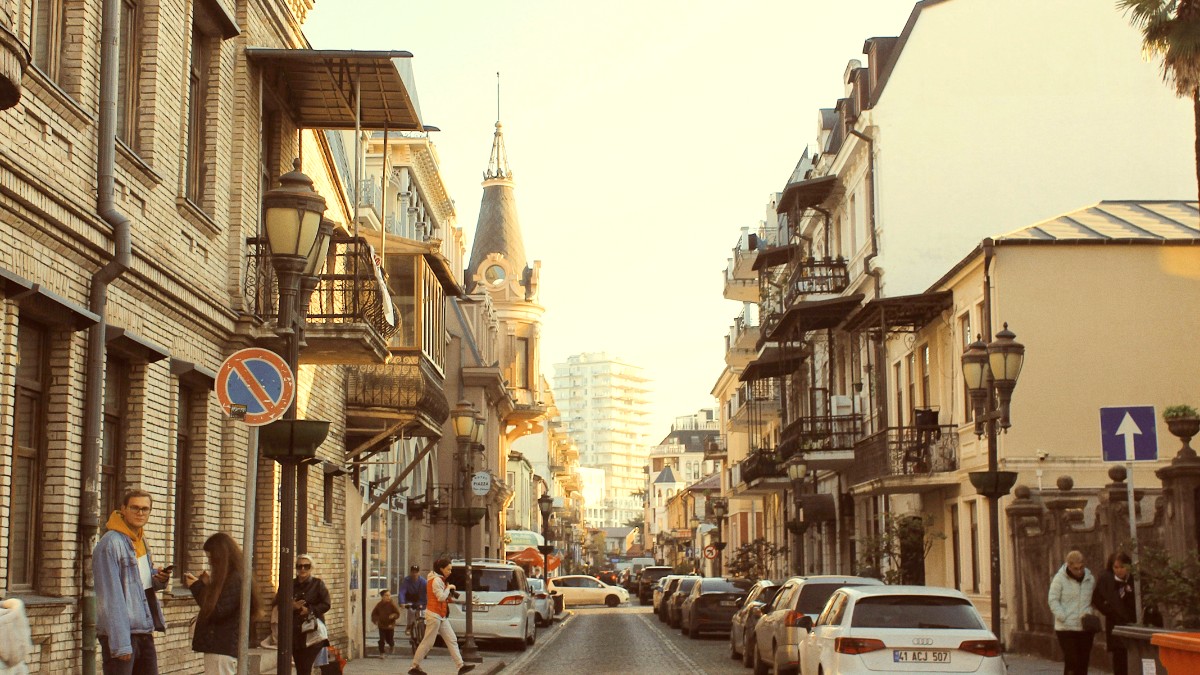
Adjara, Georgia
Georgia has three main mobile network operators: Magti, Silknet (operating as Geocell), and Beeline. Magti generally has the best network coverage. Purchasing a local SIM card is straightforward and recommended for affordable data and local calls. You will need your passport for registration. Affordable data packages are readily available.
Wi-Fi is widely available and generally free in hotels, guesthouses, cafes, restaurants, and shopping malls throughout Batumi. Many public spaces, including parts of the Batumi Boulevard, also have free public Wi-Fi. Connection speeds are usually reliable. With a local SIM card, you get reliable 4G/LTE coverage in Batumi and most populated areas.
Georgian (ქართული ენა - Kartuli ena) is the official language with its own unique alphabet. Russian is widely spoken, especially by older generations. English proficiency grows rapidly among younger generations and in tourist businesses. Google Translate is an invaluable tool; download the Georgian language pack for offline use. Its camera translation feature helps with menus and signs.
For seamless internet, a local SIM or eSIM is the top recommendation. It generally outperforms relying solely on public Wi-Fi.
Familiarity with business operating times helps with planning your day in Batumi.
Generally open from 09:00 or 10:00 until 19:00 or 20:00. Larger supermarkets or convenience stores may operate with extended hours, some even 24/7.
Typically open from 10:00 or 11:00 for lunch, continuing through dinner until 23:00 or midnight. Some bars and nightclubs run much later, especially on weekends.
Hours vary significantly. Most open around 10:00 or 11:00 and close by 17:00 or 18:00. Many museums are closed on Mondays. Always verify specific opening hours before your visit.
Banks usually operate on weekdays from 09:30 or 10:00 until 17:00 or 18:00. Some banks may have shorter hours on Saturdays and are typically closed on Sundays. ATMs are widely available 24/7. You will find them outside bank branches, inside shopping centers, at the airport, and conveniently located throughout the city center.
Georgia observes several religious and national public holidays. During these times, banks and government offices are closed. Many shops, restaurants, and tourist attractions in tourist areas remain open, but public transport may run on reduced schedules.
For museum visits or specific attractions, confirming operating hours on their official websites or by phone before heading out is a good practice.
A handshake is common when meeting someone. Close friends or family may exchange kisses on the cheek. A simple "Gamarjoba" (hello) with a smile is always appropriate. For religious sites, modest dress is mandatory for both men and women; cover heads for women (scarves are sometimes available), and shoulders and knees must be covered for both sexes.
A 10-15% service charge is often included in restaurant bills; if not, 10% is appreciated. If invited to a traditional Georgian feast (supra), prepare for abundant food and wine. Refusing a toast entirely is not polite, but small sips are acceptable. Dishes are often ordered for the entire table to share, encouraging communal dining.
Generally, photography of public places, landmarks, and landscapes is fine. Be respectful when photographing people; always ask for permission, especially in rural areas or for close-up shots. Photography may have restrictions inside some churches or monasteries, especially during services. Never photograph military bases, border crossings, or other strategic installations. Avoid sensitive political topics, especially those concerning Russia and occupied territories, unless with trusted locals who initiate the conversation. Respect local religious beliefs and practices.
Georgia is a conservative country, especially outside of the most liberal cities. While Batumi is relatively more open than some other parts of Georgia, public displays of affection for same-sex couples might attract unwanted attention or disapproval. Solo female travelers are generally safe but should exercise caution, especially when out alone at night. Use reputable ride-sharing apps and stay in well-lit, populated areas.
Observe local behavior and adjust your actions accordingly. Small acts of cultural sensitivity greatly enhance your travel experience and reception by locals.
For travelers with mobility challenges or other special needs, Batumi's infrastructure presents varying levels of accessibility.
Pavements can be uneven, with high curbs, especially in the older parts of the city (Old Town). Newer areas, notably along the Batumi Boulevard, are generally flatter and more accessible. Many older buildings, including some historical attractions, lack ramps or elevators. Newer hotels, shopping centers, and modern public buildings are typically designed with better accessibility in mind.
The Batumi Boulevard is largely flat and wide, making it generally accessible for wheelchair users. The Argo Cable Car system is usually wheelchair accessible. The Dolphinarium also generally welcomes visitors with mobility needs. Public buses and marshrutkas are generally not well-equipped for wheelchair users. Taxis and ride-sharing apps (Bolt, Yandex.Taxi) are the best options for private, door-to-door transport.
Specialized services are limited. English signage improves in tourist areas but is not universal. Information in Braille or audio guides are rare. Reliance on translation apps and the kindness of locals helps navigation.
Directly contact specific hotels, tour operators, or attractions in advance to inquire about their accessibility features. Online forums or social media groups for travelers with disabilities sometimes present recent experiences and recommendations from others who have visited Georgia.
When booking accommodation or tours, directly contact the provider to confirm accessibility features. This avoids surprises upon arrival. Plan carefully and communicate your needs for a smoother travel experience.